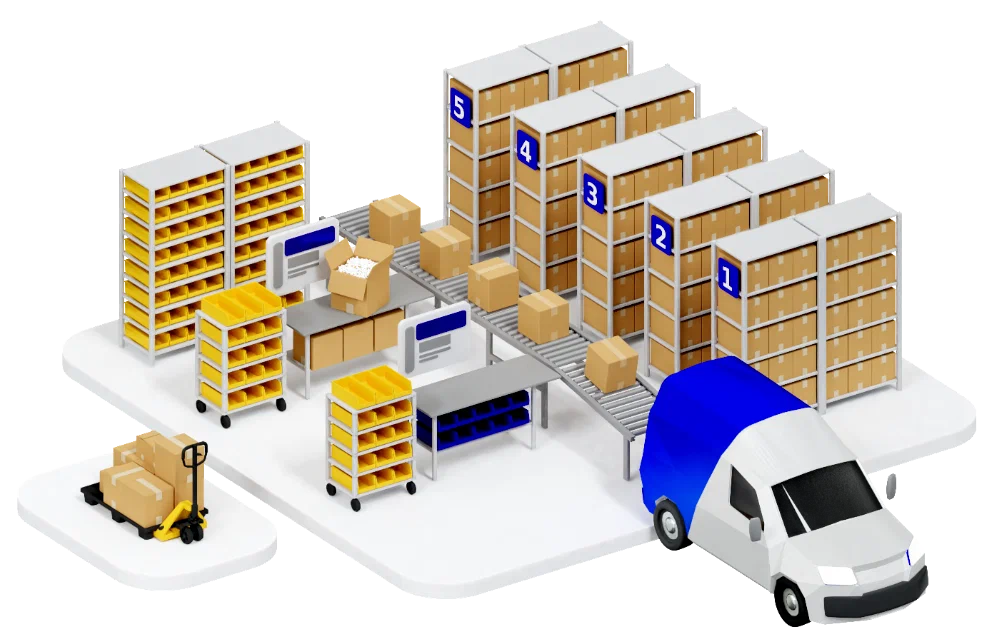In the Saudi market, effective shipping fulfillment services have become essential for businesses aiming to stay competitive. As consumer expectations for quick and reliable delivery grow, companies are increasingly turning to advanced fulfillment solutions to meet these demands. These services cover everything from warehousing and inventory management to processing and shipping orders, ensuring that businesses can deliver on their promises with efficiency and accuracy.
In this article, we will explore the essential elements of shipping fulfillment, the challenges businesses face, and how to effectively address these issues to enhance operational efficiency and customer satisfaction.
Definition of Shipping Fulfillment Services
Fulfillment services involve a comprehensive set of logistics and operational functions aimed at managing the entire process of delivering products from businesses to customers. This specialized model, particularly utilized by eCommerce and online companies, ensures that orders are processed efficiently and delivered accurately.

By collaborating with a logistics provider, often known as a Third-Party Logistics (3PL) company, businesses can outsource their entire logistics operations. This partnership allows companies to focus on other aspects of their business while experts handle the complexities of order processing, warehousing, and delivery.
The Process of Shipping Fulfillment Services
The process of shipping fulfillment services is a complex, multi-step operation designed to ensure that products move efficiently from warehouse to customer. This process is crucial for maintaining high standards of service and customer satisfaction. Here’s how it typically works:
- Inventory Management
The first step in shipping fulfillment is managing inventory. This involves receiving, storing, and organizing products in a warehouse. Advanced systems track stock levels, monitor product conditions, and ensure that items are easily accessible for order processing. Effective inventory management helps prevent stockouts and overstock situations, ensuring that products are available when needed.
- Order Processing
Once an order is placed, it enters the order processing stage. This includes verifying the order details, picking the products from the warehouse, and preparing them for packing. In modern fulfillment centers, automation and technology play a significant role in speeding up this process, reducing human error, and enhancing efficiency.
- Packing
After picking products, they are packed according to specific standards to ensure they are protected during transit. Proper packing involves selecting the right materials, ensuring that items are securely packaged, and labeling them correctly. Efficient packing not only helps in safeguarding products but also in optimizing shipping costs and space.
- Shipping
The packaged orders are subsequently transferred to shipping carriers. The choice of carrier and shipping method can vary depending on factors like delivery speed, cost, and destination. Shipping fulfillment services often involve coordinating with multiple carriers to offer a range of shipping options, including standard, expedited, and same-day delivery.
- Tracking and Delivery
Once shipped, orders are tracked to ensure they reach their destination on time. Real-time tracking systems provide customers with updates on their order status, enhancing transparency and trust. Effective tracking helps manage customer expectations and address any delivery issues promptly.
- Returns Management
An often-overlooked aspect of shipping fulfillment services is handling returns. This involves processing return requests, managing returned inventory, and ensuring that issues are resolved efficiently. A streamlined returns process is crucial for maintaining customer satisfaction and managing reverse logistics.
- Customer Service
Throughout the fulfillment process, customer service plays a vital role. Providing support for order inquiries, handling issues, and resolving complaints helps maintain a positive customer experience. Effective customer service ensures that any problems are addressed swiftly and satisfactorily.
By integrating these steps, shipping fulfillment services ensure that products are delivered efficiently and accurately, contributing to overall customer satisfaction and operational success.
What Are the Advantages & Disadvantages of Shipping Fulfillment Services?
Shipping fulfillment provides several advantages and some drawbacks that businesses should consider when deciding whether to outsource their logistics.
Advantages of Shipping Fulfillment Services
- Enhanced Efficiency
Fulfillment companies specialize in managing warehouse operations and optimizing the order process. Their dedicated focus often results in faster, more accurate, and more efficient order processing compared to what an individual business might achieve on its own.
- Cost Savings on Staffing
Partnering with a fulfillment service can lower staffing costs. The provider handles all related expenses, including salaries, benefits, and taxes, which translates to significant savings for businesses.
- Broader Product Range
By utilizing a fulfillment center, online stores can offer a wider selection of products without the need to maintain extensive inventories themselves. Fulfillment centers bring expertise in inventory management, allowing for a diverse product offering.
- Scalability
Fulfillment services offer the flexibility to scale operations according to seasonal demands. Whether dealing with a surge in orders or a seasonal slowdown, fulfillment centers can efficiently manage varying order volumes.
- Focus on Core Activities
Outsourcing to a fulfillment service enables businesses to concentrate on critical areas like product development, marketing, and brand building. This shift in focus helps drive growth and improve overall business performance.
- Cost-Effective Shipping
Fulfillment companies often have established relationships with carriers, allowing them to find the most cost-effective shipping options. This can enable online stores to offer faster shipping options, such as 2-day or 3-day delivery, at competitive rates.
Disadvantages of Shipping Fulfillment Services

- Associated Costs
While shipping fulfillment services offer numerous benefits, they come with costs. Fees for receiving, warehousing, integrating technology, and order processing can add up. Businesses must weigh these costs against the advantages to determine if the investment is worthwhile.
- Reduced Control
Outsourcing fulfillment means giving up a degree of control over the logistics process. Choosing the right fulfillment partner is crucial to ensure that the service aligns with the business’s specific needs and standards.
When considering shipping fulfillment services, businesses should assess their current and future logistics requirements. Different fulfillment centers offer varying levels of service, from basic warehousing and shipping to comprehensive solutions that include returns management. Careful research and evaluation are essential to find a fulfillment provider that matches the business’s goals and operational needs.
Technological Innovations in Shipping Fulfillment Services

Technological advancements have revolutionized the services of shipping fulfillment, enhancing efficiency, accuracy, and customer satisfaction. Here’s a look at some key innovations transforming the industry:
- Automated Warehousing Systems
Modern fulfillment centers are increasingly adopting automation to streamline operations. Automated systems, such as robotic picking and sorting, reduce human error and speed up order processing. These technologies can swiftly retrieve and sort products, allowing for faster packing and shipping.
- Advanced Inventory Management
Sophisticated inventory management systems utilize real-time data and predictive analytics to optimize stock levels. These systems help prevent overstocking and stockouts by forecasting demand more accurately. Integration with other eCommerce platforms ensures seamless updates and better control over inventory.
- Artificial Intelligence and Machine Learning
AI and machine learning are enhancing decision-making in shipping fulfillment. Algorithms analyze historical data and trends to optimize routes, predict delivery times, and manage inventory. AI-driven chatbots also provide real-time customer support, addressing inquiries and tracking issues promptly.
- Internet of Things (IoT)
IoT technology connects devices and sensors throughout the fulfillment process. Smart sensors monitor environmental conditions like temperature and humidity, ensuring that sensitive products are stored and transported under optimal conditions. IoT devices also track shipments in real-time, providing transparency and reducing the risk of delays.
- Cloud-Based Platforms
Cloud-based fulfillment solutions offer scalable and flexible services, allowing businesses to access their fulfillment operations from anywhere. These platforms facilitate real-time communication between fulfillment centers, retailers, and customers, improving overall coordination and efficiency.
- Blockchain Technology
Blockchain technology provides a secure and transparent way to manage supply chain data. It ensures the integrity of shipment records and reduces fraud by creating an immutable ledger of transactions. This technology enhances traceability and accountability throughout the shipping process.
These technological innovations in shipping fulfillment services are reshaping the logistics landscape, driving improvements in speed, accuracy, and customer satisfaction. As technology continues to evolve, fulfillment services will become even more efficient and responsive to the needs of businesses and consumers.
Key Challenges of Shipping Fulfillment Services
Shipping fulfillment services face several challenges that can impact efficiency and customer satisfaction.

- Inventory Management is a critical issue, with risks of overstocking or stockouts affecting costs and sales.
- Order Accuracy is another challenge; errors in picking and packing can lead to customer dissatisfaction and returns.
- Shipping Costs often strain profit margins, especially with the need to balance cost with delivery speed.
- Delivery Speed is a growing concern, as meeting customer expectations can be difficult, particularly during peak times.
- Returns Management adds complexity, with handling returns and reverse logistics requiring significant resources. Lastly,
- Scalability is a challenge, as adapting to fluctuating order volumes can overwhelm fulfillment systems. Addressing these challenges effectively is crucial for maintaining high performance and ensuring a positive customer experience.
Conclusion
Effective shipping fulfillment services are vital for ensuring that products reach customers promptly and accurately. By leveraging advanced technologies and efficient logistics processes, businesses can streamline their operations, reduce errors, and enhance customer satisfaction. With innovations such as automation, AI, and real-time tracking, shipping fulfillment solutions have evolved to meet the demands of modern commerce. Embracing these advancements can lead to significant improvements in efficiency and service quality.
Get in touch with the “3rd Partner” today to see how our tailored solutions can streamline your fulfillment process and support your business goals. Let’s ensure your products reach your customers quickly and efficiently.












